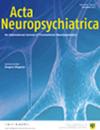Neuropsychiatric symptoms in post COVID-19 long haulers.
IF 2.5
4区 医学
Q1 Medicine
引用次数: 9
Abstract
BACKGROUND Long haulers have been recently reported after contracting coronavirus disease (COVID-19). In the present study, we aimed to screen for the neuropsychiatric signs detected <1 to >6 months after infection by severe acute respiratory syndrome coronavirus 2 (SARS-CoV-2) and to determine whether vaccination has an effect on them. METHODS An online survey was conducted among participants who had been diagnosed with laboratory-confirmed SARS-CoV-2 infection. The clinical signs and durations of neuropsychiatric complaints and their correlations to sex, age, severity of COVID-19 signs, and vaccination status were screened. RESULTS A total of 2218 individuals, including 1358 females and 860 males, with an age range of 12-70 years, submitted their responses. The respondents experienced cognitive dysfunction, mood alteration, depression, tinnitus, sleep disorders, and loss of taste and smell, with prevalence rates ranging from 18.9% (tinnitus) to 63.9% (loss of taste and smell). Of the respondents, 2.2-7.7% of confirmed the persistence of symptoms for >6 months. Tinnitus was the least common complaint, and only 2.2% of the study participants had tinnitus for >6 months. Meanwhile, mood alteration persisted for >6 months in 7.6% of the study participants. More respondents who received two doses of BNT162b2 vaccine showed persistent symptoms than those in the other groups. Disease severity and female sex were identified as potential determinants of the development and persistency of such symptoms. CONCLUSION Post-COVID neuropsychiatric symptoms were present in considerable percentages of the study participants with SARS-CoV-2 infection, persisting for >6 months in up to 7.6% of the participants.COVID-19后长途跋涉者的神经精神症状
背景最近有报道称长途搬运工感染了冠状病毒病(COVID-19)。在本研究中,我们旨在筛查感染严重急性呼吸综合征冠状病毒2 (SARS-CoV-2) 6个月后检测到的神经精神体征,并确定疫苗接种是否对其有影响。方法对实验室确诊的SARS-CoV-2感染患者进行在线调查。筛选神经精神疾病的临床症状和持续时间及其与性别、年龄、COVID-19症状严重程度和疫苗接种状况的相关性。结果共有2218人提交问卷,其中女性1358人,男性860人,年龄12 ~ 70岁。受访者经历认知功能障碍、情绪改变、抑郁、耳鸣、睡眠障碍、味觉和嗅觉丧失,患病率从18.9%(耳鸣)到63.9%(味觉和嗅觉丧失)不等。在应答者中,2.2-7.7%的人确认症状持续6个月。耳鸣是最不常见的抱怨,只有2.2%的研究参与者有耳鸣长达60个月。与此同时,7.6%的研究参与者的情绪变化持续了60个月。接受两剂BNT162b2疫苗的应答者比其他组出现持续症状的应答者更多。疾病严重程度和女性性别被确定为这些症状发展和持续的潜在决定因素。结论在相当比例的SARS-CoV-2感染的研究参与者中存在covid后神经精神症状,在高达7.6%的参与者中持续6个月。
本文章由计算机程序翻译,如有差异,请以英文原文为准。
求助全文
约1分钟内获得全文
求助全文
来源期刊

Acta Neuropsychiatrica
医学-精神病学
CiteScore
8.50
自引率
5.30%
发文量
30
审稿时长
6-12 weeks
期刊介绍:
Acta Neuropsychiatrica is an international journal focussing on translational neuropsychiatry. It publishes high-quality original research papers and reviews. The Journal''s scope specifically highlights the pathway from discovery to clinical applications, healthcare and global health that can be viewed broadly as the spectrum of work that marks the pathway from discovery to global health.
 求助内容:
求助内容: 应助结果提醒方式:
应助结果提醒方式:


